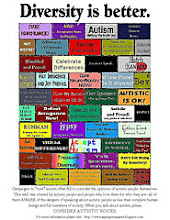Unprofessional Umpires?
I zip up to the office at school:
“I was just wondering when they were going to start?” I ask the school secretary.
“I don’t know hun but I sure hope it’s soon for your sake.”
I pull a face, because at recess [translation = break time] my little guys are at sea. It has long been recognized that an autistic child often has the toughest time when the structure [translation = scaffolding] falls away and they are left to their own devices. When you observe an autistic child in a special ed classroom facility, you could be forgiven for wondering what on earth half of them are even doing there. However, one glance of the same children at recess, will confirm that any label attached to them is entirely accurate.
For my guys, recess used to mean cowering in a corner , head covered and bleating. For the other, the sensory overload manifested itself in aggression and violent outbursts. Neither child, nor their peers, fared well. Their behaviour also impacted the rest of the school. [translation = mainstream kids] Overall, this was not a happy situation for anyone.
To be fair, I’m not sure of their proper job title, but 'umpire,' [translation = referee] is a good enough approximation for me. It captures the essence of their job’s responsibilities; they have to ensure that everyone plays fairly. [translation = Marquis of Queensbury’s rules please] They don’t constitute a professional body of working people, [translation = no recognized paper qualifications] and are generally referred to as Yard Duty ladies. But at the same time, I can see that this title doesn’t really give full credit to their status in my eyes.
It’s like waiting for the return of the cavalry. These volunteers accept a minimum wage, to spend an hour on the play ground and teach social skills, amongst many other things. It’s also called ‘lunch duty’ here abouts, but it’s not about eating, it’s about children interacting with one another. There is a great deal of interaction between the children but a great deal of it is inappropriate. The children need the expert guidance of the facilitator, so that the children can learn to make better decisions, better choices, that a stick is not the best method of persuasion and that there are other more effective tools, such as words.
For those children that don’t have a great many words, or lack the confidence to attempt to use them, the volunteers are their with on the spot help and encouragement. They are their to reinforce those first tentative attempts, to praise and reinforce, their trials and tribulations. Those children would be the special ed kids, often autistic kids. These women, are in the front line, or the line of fire, depending upon your bias.
They’re there to mix them up, the typically developing children [translation = normal] and the special ed children [translation = those weirdo kids]. And there’s no danger money on offer here. Before the volunteers materilize to take charge, the special ed kids are struggling and the mainstream kids are avoiding. But once the umpires [translation = facilitators] arrive, they ensure that they negotiate. They explain and guide them, each day, every week, throughout the year, until by the time the summer arrives a whole host of new friendships have been developed with their help, and a buffer zone of tolerance protects all the children.
Unprofessional umpires they may be, but for me, they're more a group of unsung heros.





3 comments:
Lol, the kids here call them "dinner nannys". They have no idea how to cope with a child who is "different"
We are exceptionally lucky in this regard. They have made the most tremendous positive difference for both my boys and I am grateful to each and every one of them.
Cheers dearies
What a wonderful situation you have there. Good for all of the kids! We don't have that at Leo's school. Our identified kids are plopped on swings or ignored unless they "get into trouble". Okay, you got me all fired up now - I'll have to blog on this one!
Post a Comment